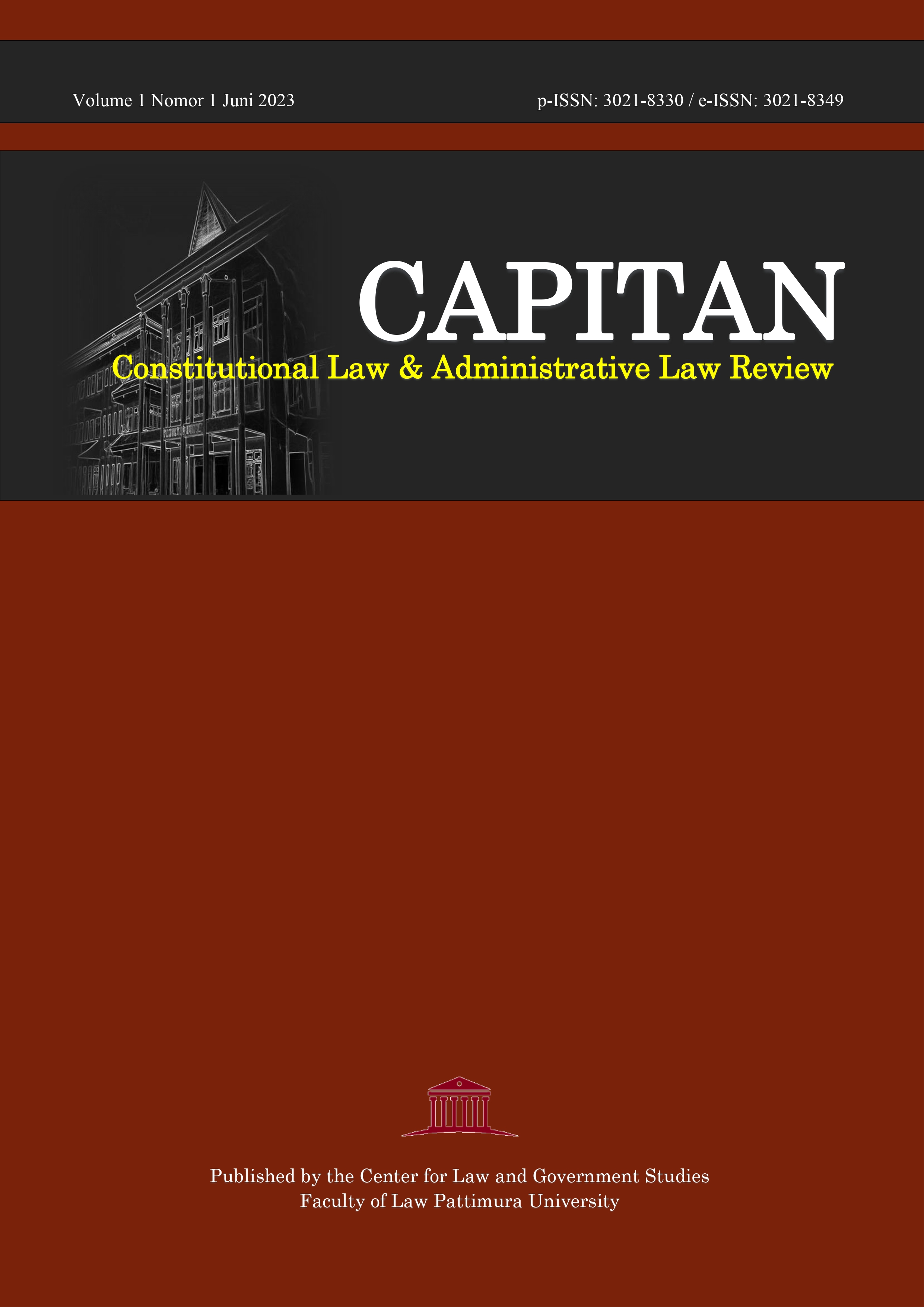Kewenangan Pemerintah Kota Ambon Terhadap Anak Korban Eksploitasi Ekonomi
Abstract
The authority of the Ambon city government over child victims of economic exploitation is urgently needed, given that children are the next generation of the nation and state that must always be protected, and their growth and development is paid attention to with the rights they have which have been regulated in the Laws and Regulations. The purpose of this study was to find out and understand how the authority of the Ambon City Government for Children Victims of Economic Exploitation is in accordance with Legislation and what forms of legal protection for children who are victims of economic exploitation. The research method used is normative legal research method and is analyzed qualitatively. The results and discussion show that the Ambon City Regional Government is based on the provisions of Article 20 and Article 21 paragraph (1) to (4) of Law Number 35 of 2014 concerning Child Protection and the provisions of Article 23 paragraph (4) of Ambon City Regional Regulation Number 1 of 2019 Concerning the Implementation of Child Friendly Cities, has authority over the implementation of Child Protection, respects the fulfillment of Children's Rights, guarantees the fulfillment of Children's Rights and is responsible for formulating and implementing policies in the field of implementing Child Protection. Authority Regional Government Against Children according to Law Number 35 of 2014 concerning Child Protection includes the obligations and responsibilities of the Regional Government. However, in the Ambon City Regional Government Regulation which specifically regulates the implementation of Means of Fulfilling Legal Protection Rights for children, it does not give law enforcement authority to the Regional Government against the perpetrators.
Downloads
References
Astuti Nur Fadillah, Anna Maria Salamor, Patrick Corputty, Penyuluhan Hukum Perlindungan Anak Pada Lembaga Kesejahteraan Sosial Anak (LKSA) Ittaqollah Kota Ambon, Volume 1 Nomor 2, September 2021.
Eka Putri Ari Hari, Faktor-Faktor Yang Mempengaruhi Eksploitasi Orang Tua Terhadap Anak Jalanan, 2018.
Hanna Ufila, Perlindungan Hukum Terhadap Anak Korban Eksploitasi Ekonomi Disertai Kekerasan.
http://repo.unsrat.ac.id/276/1/TINJAUAN_TERHADAP_KEWENANGAN_PEMERINTAH_
DAERAH.pdf
https://media.iyaa.com/article/2016/03/Ini-5-Faktor-terjadinya-Eksploitasi-Anak3438010. Html. Diakses pada 4 November 2022
https://perpustakaan.pancabudi.ac.id/dl_file/penelitian/19948_2_BAB_II.pdf
Syarifah Qurrata Ayyun Kusumaningsih Rukhsal, Jurnal Faktor-Faktor Penyebab Eksploitasi Secara Ekonomi Terhadap Anak Jalanan Dalam Perspektif Hukum Perlindungan Anak
Pricilia Uty Vianty Loppies. Penerapan Pasal 59 Undang-Undang Nomor 35 Tahun 2014 Terhadap Anak sebagai Korban Perlakuan Salah dan Penelantaran, Jurnal Penelitian Fakultas Hukum Universitas Pattimura Volume 1 Nomor 2, April 2021
Ridwan H.R., Diskresi & Tanggungjawab Pemerintah, Yogyakarta: FH UII Press, 2014, hlm. 114-115.
Rusadi Kantaprawira, Makalah: Hukum dan Kekuasaan, Yogyakarta: Universitas Islam Indonesia, 1998.
Yossie Yasicha Pasaribu, Penerapan Hak Anak Untuk Mendapatkan Pendidikan Dasar Di Kecamatan Ngabang Berdasarkan Convention On The Rights Of The Child (Crc) 1989, Volume 5, No 1 (2016)
Copyright (c) 2023 Junet Daniela Yesayas, Saartje Sarah Alfons, Merlien Irene Matitaputty

This work is licensed under a Creative Commons Attribution-NonCommercial 4.0 International License.
Authors who publish their manuscripts in this Journal agree to the following conditions:
- The copyright in each article belongs to the author, as well as the right to patent.
- Authors are able to enter into separate, additional contractual arrangements for the non-exclusive distribution of the journal's published version of the work (e.g., post it to an institutional repository or publish it in a book), with an acknowledgment of its initial publication in this journal.
- Authors are permitted and encouraged to post their work online (e.g., in institutional repositories or on their website) prior to and during the submission process, as it can lead to productive exchanges, as well as earlier and greater citation of published work.
- Authors have the right to self-archiving of the article (Author Self-Archiving Policy)













